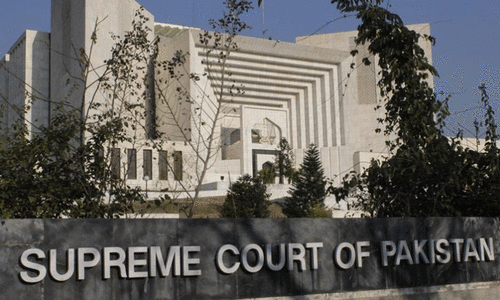ISLAMABAD: Chief Justice of Pakistan (CJP) Mian Saqib Nisar has expressed the confidence that consensus can be developed on the construction of two dams in the country and that he will soon announce good news in this regard.
Heading a two-judge Supreme Court bench which took up a loan write-off case on Saturday, the CJP said that he had held significant meetings over the past few days on the issue of dams and found that consensus existed among all stakeholders on the construction of two dams.
He said the money received from loan defaulters could be used for the construction of these dams.
On June 27, the CJP presided over a consultative meeting organised by the Law and Justice Commission of Pakistan for organising a national workshop to evaluate the severity of water shortage in the country and to recommend remedial measures, including construction of dams.
Expresses confidence that consensus can be developed for two dams
Later, CJP Nisar assured the provinces that no disputed dam would be constructed and reservation of all provinces would be addressed and consensus would be developed for the construction of dams. He had also stated that the apex court would provide institutional support in this regard.
During the proceedings on Saturday, senior counsel Farooq H. Naek said that the name of CJP Nisar would be written in golden words for his endeavour for the construction of dams in the country.
Non-performing loans
Taking notice on media reports, the SC in 2008 initiated proceedings on the alleged waiving of non-performing loans quietly by the State Bank of Pakistan under a scheme introduced by former president retired Gen Pervez Musharraf.
The CJP observed that a number of companies out of the list of 222 firms to which notices had been issued by the apex court had expressed willingness to return 75 per cent of the loans which had been written off under the scheme.
He said the cases of those companies which had not shown willingness to return their loans would be sent to banking courts.
The apex court cautioned that in case the banking courts decided against these companies, they would have to pay the total amount of their loans and that their people could be sent to jail.
When a number of lawyers representing various companies pleaded before the court not to refer their cases to the banking courts, the SC directed them to come out with a viable solution on how it could proceed with the matter.
The apex court postponed further proceedings until July 4.
Soon after the 2002 elections, then finance minister Shaukat Aziz and his financial team approved the loan write-off scheme and as a result the SBP governor issued BPD Circular 29 of the 2002.
Instead of launching an effective campaign for the recovery of the non-performing loans, the SBP issued an incentive scheme to the banks/DFIs (Development Finance Institutions) in October 2002 for waiving the non-performing loans of the organisations showing “loss” for three years.
On Feb 20, 2013, the SC ordered making public the report spreading over 2,200 pages in three volumes compiled by its former judge Syed Jamshed Ali Shah as head of a three-man commission to probe into bank loan write-offs worth billions of rupees from 1971 to 2009
According to the commission report, the total number of written-off loans over the past four decades was Rs87 billion, the major chunk of which is Rs84.621 billion between the period 1992 to 2009 whereas it is Rs2.3 billion from 1971 to 1991.
In the voluminous report the commission had regretted that it examined a total of 740 cases but despite its best efforts, the banks and DFIs did not provide information on loans sanctioned or written-off on “other than business considerations” adding either the bankers were afraid of politicians or civil/military bureaucracy, or were privy to sanctioning of loans or factually the quantum of such loans was not high.
Published in Dawn, July 1st, 2018















































